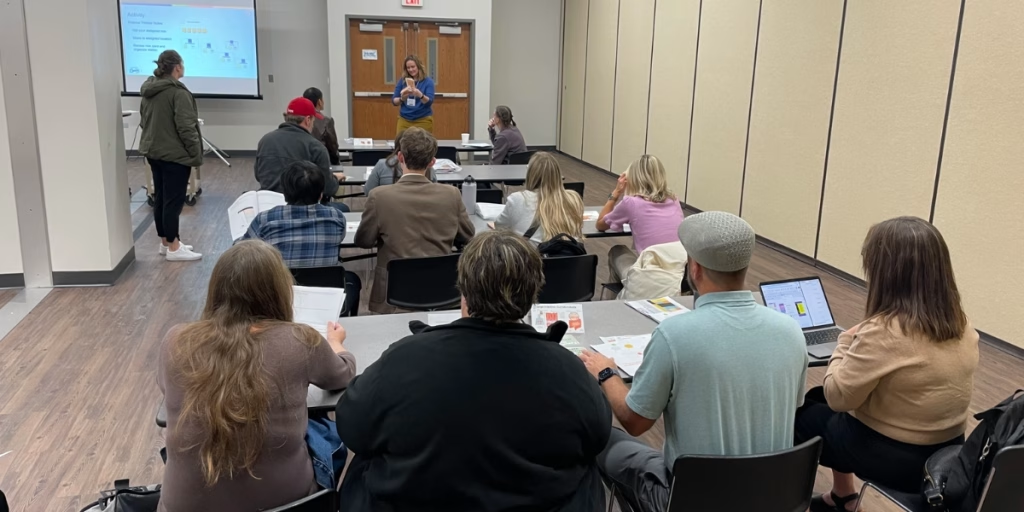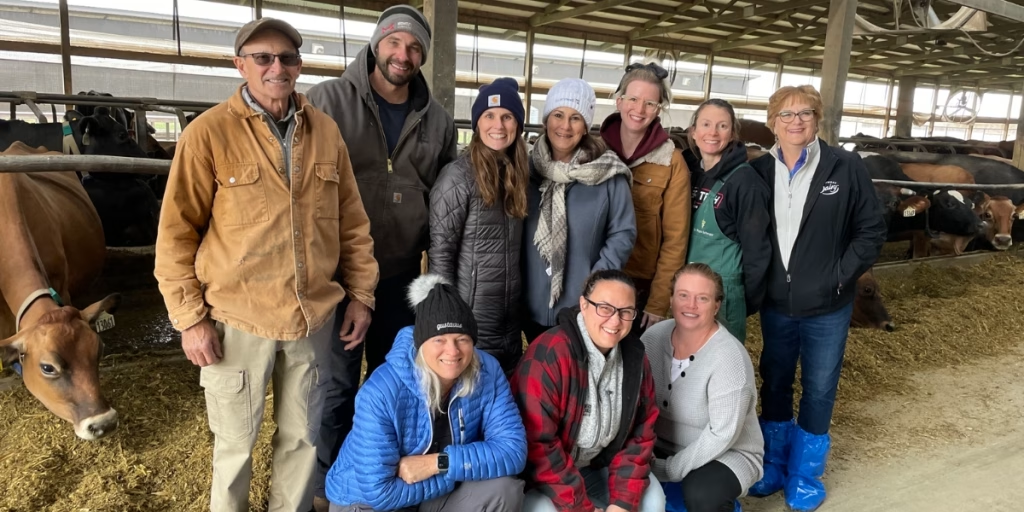Midwest Dairy proudly offers educators a discovery curriculum incorporating STEM concepts designed for elementary through high school students. This curriculum teaches students where their milk comes from and emphasizes the dairy industry’s global contributions. Checkoff has invested significant time into integrating dairy into science education, finding it to be an ideal fit for STEM programming. Read on to learn how Midwest Dairy collaborates with educators, especially in the science classroom.
Midwest Dairy provides dairy-focused STEM resources to Nebraska Science Teachers
Midwest Dairy presented at the annual Nebraska Association of Teachers of Science (NATS) conference on October 18, hosting a breakout focused on integrating dairy into STEM education. A consultant and former high school educator introduced dairy-focused resources for STEM education.

During this session, 15 science teachers explored the newly badged dairy curriculum, “Postgame Analysis.” This unit highlights how milk can serve as an effective recovery beverage for athletes. The teachers learned about the unit and how to implement the curriculum and participated in an experiment demonstrating how students might engage with these materials in the classroom.
The teachers in attendance were engaged and posed insightful questions about utilizing the information in their classrooms. Participants were provided information on accessing the materials and various dairy-focused STEM resources. These educators will be able to share these resources and apply the information in their schools.
Additionally, Midwest Dairy sponsored an ice cream break during the conference, during which attendees received information on where to find the dairy STEM resources while enjoying a delicious dairy treat.
Relevancy of Food and Agriculture in Science Promoted with Minnesota State Science Association
Midwest Dairy partnered with the Minnesota State Science Teachers Association (MNSTA) this fall to demonstrate how food and agriculture concepts can enhance science education. This collaboration included a webinar, multiple newsletters, listserv updates, and two interactive sessions at the annual conference in St. Cloud.
With the Next Generation Science Standards now implemented in Minnesota schools, this partnership provided an excellent opportunity to equip educators with access to new, free resources and training on STEM units, transfer tasks, and phenomena.
Several activities occurred during this collaboration, including October’s “Food Totally Transfers” webinar, which emphasized the importance of transfer tasks in fostering three-dimensional learning by linking theoretical knowledge with real-world applications. Nine teachers attended this webinar, and the recorded session was later shared via the listserv, an online sharing platform. Throughout the fall, four email updates and two newsletters were distributed, reaching over 1,812 teachers. A shared vendor table with the Science Museum provided additional opportunities to interact with teachers and share new educational resources. The Checkoff team received many positive comments about the relevance of using food and agriculture to teach science concepts. More than 60 attendees registered at our table and entered a drawing for three resource kits, which included tools to implement some of the curriculum.
Additionally,14 teachers participated in the “Digestion Drama” workshop, where they acted out the process of milk digestion. The teachers were highly engaged, asked insightful questions, and discussed ways to apply this experience in their classrooms.
Finally, Midwest Dairy hosted a three-hour immersive training session using the Media Mayhem curriculum. During the session, teachers assumed the role of students as they investigated media claims about the environmental impact and sustainability in the dairy industry. A farm tour followed the workshop to provide context about sustainability practices at the farm. NexGen Dairy led the informative tour and addressed numerous questions. The participants received the lesson unit in advance, focusing on sustainability and animal care.
These activities have built a strong foundation and network throughout Minnesota to foster teacher engagement and expose them to innovative ways to incorporate food and agriculture into their classrooms. Midwest Dairy will continue to look at ways to partner with MNSTA to provide professional development opportunities that highlight the relevancy of food and agriculture with these new resources.
